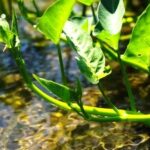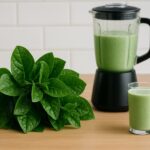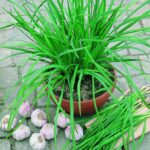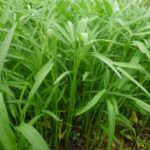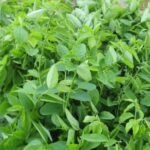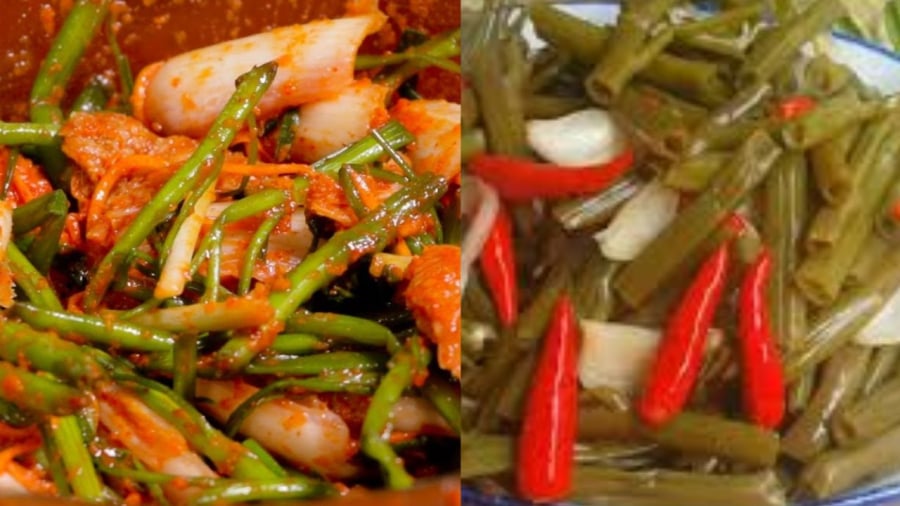
1. Traditional Sweet and Sour Water Spinach Stems
Ingredients:
– 1 bunch of water spinach (approx. 300-400g), using mostly the older stems and discarding the leaves. The older stems are preferred for their crisp texture.
– 5 Thai chili peppers (adjust according to your spice preference, or omit if you don’t like spice)
– 5 shallots
– 5 garlic cloves
– 150g sugar
– 1 tablespoon sea salt (do not use powdered seasoning)
– 120ml white vinegar
– 500ml water
Preparation:
– Remove the leaves from the water spinach and keep only the stems. The stems provide a crisp texture and prevent a mushy consistency.
– Wash the stems thoroughly under running water, then soak them in a dilute salt solution or a specialized vegetable wash. This helps eliminate any bacteria or parasites and keeps the green color vibrant.
– Rinse again with clean water and let it dry. Cut the stems into bite-sized pieces, approximately 5-7 cm in length.
– Peel and thinly slice the shallots and garlic. Rinse the chili peppers and leave them whole or slice them if you prefer more spice.
Pickling Liquid:
– In a pot, combine 500ml of water, 150g of sugar, 1 tablespoon of sea salt, and 120ml of white vinegar.
– Bring the mixture to a boil, stirring occasionally to dissolve the sugar completely.
– Allow the pickling liquid to cool down entirely before adding the water spinach to prevent overcooking the vegetable.
Pickling Process:
– In a clean glass or plastic container, combine the water spinach stems, garlic, shallots, and chili peppers.
– Pour the cooled pickling liquid over the vegetables, ensuring they are completely submerged. You can use a small plate or weight to keep the vegetables immersed. Avoid leaving any stems exposed, as they may discolor and develop mold. This process is similar to pickling cabbage or cucumbers.
– Seal the container and store it in a cool, dry place, away from direct heat. After 3-4 days, the water spinach will undergo fermentation, turning a light brown color, and will be ready to eat. It will have a delightful crisp texture and a balanced sweet and sour flavor.
– Serving suggestion: This sweet and sour water spinach makes a great side dish with rice, boiled meat, or fish. Store it in the refrigerator to maintain its crispness, and it will last for 5-7 days.
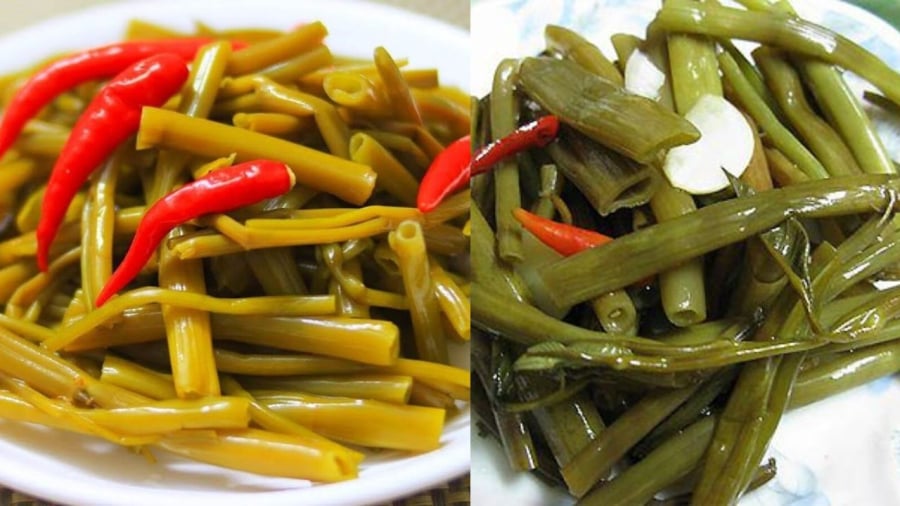
2. Korean-Style Water Spinach Kimchi
If you’re a fan of bold flavors and a mild spicy kick, try this unique twist on water spinach by making kimchi. This simple recipe captures the essence of kimchi while adapting it to suit Vietnamese tastes and the tropical climate.
Ingredients:
– 1 bunch of water spinach
– 2 tablespoons Korean chili powder (adjust to your spice preference)
– 1 tablespoon sugar
– 1 onion
– 1 carrot
– Scallions
Preparation:
– Remove the leaves from the water spinach and keep only the stems. Soak the stems in 3 tablespoons of salt for about 2 hours. This process helps soften the stems while retaining their crispness, and the salt draws out excess water, making the stems chewier.
– After soaking, rinse the stems with clean water and gently squeeze out the excess water to reduce the saltiness.
– Finely chop the onion and scallions. Grate the carrot. Soak these vegetables in cold water for about 30 minutes to reduce their pungency.
Mixing the Kimchi:
– In a large bowl, combine the water spinach stems, carrot, onion, and scallions.
– Add the Korean chili powder and sugar to the mixture. Wear plastic gloves to protect your hands from the spice, and mix everything thoroughly by hand. You can add a small amount of water to help the spices adhere to the vegetables.
– This kimchi can be enjoyed immediately after mixing or stored in an airtight container in the refrigerator for 1-2 days to develop a mild sourness and deeper flavor.
Tip:
– For an even more authentic Korean flavor, add some Korean chili paste or pureed Asian pear to enhance the natural sweetness.
– However, this recipe has been tailored to suit Vietnamese palates and the tropical climate, omitting the use of fermented shrimp paste commonly found in traditional Korean kimchi.
The Ultimate Superfood: A $1 Bargain for Healthy Hair and Glowing Skin
You don’t need to spend a fortune on expensive cosmetics to achieve healthy hair and skin. For just a fraction of the cost, you can nourish your hair and skin with a simple ingredient – water spinach! For only 10,000 VND, you can purchase water spinach and create your own natural hair and skin care treatment at home.
5 Common Vegetables to Eat Year-Round: Affordable and Nutritious Options for a Healthy Diet
Vietnam is a country with a thriving agricultural sector, boasting an abundance of diverse fruits and vegetables. Among this plethora of produce, there are five particular types of vegetables that stand out, not only for their affordability but also for their proven health benefits, as supported by experts and scientific research.
5 Vegetables That Are Both Daily Soup Ingredients and Medicinal Cures
The esteemed work of Professor Do Tat Loi, ‘Medicinal Herbs and Plants of Vietnam’, offers an extensive guide to the myriad medicinal plants and herbs found in Vietnam. Among the plethora of plants detailed within its pages are some familiar culinary herbs, commonly used by locals in their soup dishes.
























